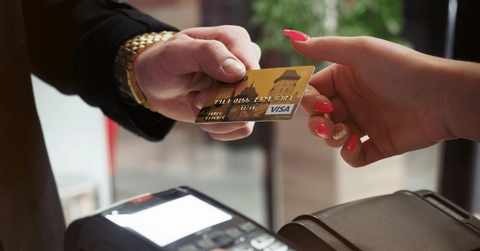5 Tips for Taking Out Your First Credit Card

Feb. 20 2024, Published 2:55 p.m. ET
In today’s world, needing and using a credit card is almost a rite of passage. While most people would prefer to avoid them altogether if possible, young people starting out on their own often find it difficult to navigate all the expenses and necessities that come with adulting. While it can be exciting when one begins receiving their first applications for a credit card, having and using one comes with a lot of responsibility.
Aside from being disciplined, there are a lot of legalities and technical rules that apply to credit cards and their use. Banks usually also attach their use to complex legal contracts, while things like fees, interest, and other charges can become a nightmare to the uninitiated. If you’re thinking about getting your first credit card, here are five handy tips to help make it a smoother experience, and you can find further guidance and in-depth help here, too.
1. Keep Up With Payments
Credit cards, like most financial services, are best enjoyed when minimum payments are kept up to date. Just as paying your taxes can lead to rebates, good credit card habits can lead to perks and rewards. For most credit cards to function properly, it’s usually a good idea to have them linked to a check-in or debit account. That way, when payments need to be made, or money needs to be transferred for use by either account, the process can be a smoother one. In the age of digital banking, most bank customers should have a banking app that can be downloaded and accessed from a smartphone and is capable of performing all basic banking functions like payments and transfers.
Since credit cards provide temporary use of the bank’s money that’s meant to be repaid later, with interest, it’s vitally important that all credit card payments are made on time. Regardless of how much you owe in total, there’s typically a minimum monthly premium that must be made to keep your credit card account open, active, and up to date in terms of payment.
It’s a good idea to set up an autopay authorization option that can automatically transfer funds from your other account(s) to your credit card to either pay the minimum amount due or pay whatever larger amount toward the total you want to. Unfortunately, we all can’t live the life of celebrities who can afford to drop millions like it’s nothing. For the rest of us, minimum credit card payments must always be up-to-date. The upside is this will augur well for your credit score and will help you avoid negative credit listings or the credit card company needing to hound you to make payment.
2. Choose Carefully
Depending on the region you’re in, you may have a wide range of banks and financial institutions to apply for a credit card from. It is, therefore, important to choose the best option for yourself. Different banks may offer different deals on how much credit they’re willing to extend you, how much fees you will have to pay, and how steep your interest rate will be.
Unfortunately, when it comes to these kinds of accounts, the devil is often in the details, so it’s good to shop around or know your budget beforehand, so you can make an informed choice. This is also important to ensure you can stay within your budget and do not overextend yourself by taking on more credit than you need. Doing your research about the different options available can also help you get a better deal in terms of bank charges, fees, and a reasonable interest rate.
3. Keep Utilization Within Acceptable Limits
Owning and using a credit card can work in two ways that either positively or negatively affect your credit score. For example, using all or most of the available credit, being late on payments, or both, can be very detrimental to your credit health. Those kinds of credit card activities will result in negative listings against your name, can make it harder to apply for further credit, and result in a lot of added fees and interest that need to be paid back
On the other hand, most credit bureaus recommend that, if possible, only 10 to 30% of a credit card’s available limit should be utilized. If this is combined with regularly and promptly making minimum payments when they fall due, the result will be positive listings that boost your credit score. Aiming for a good credit score can be especially important in the case of a financial emergency, as it means you will have better access to credit if you suddenly need it.
4. Make Use of Rewards
Most credit card accounts come with rewards programs that incentivize good spending habits or simply reward you for using your card. Many banks often sign deals with other companies to provide perks and incentives that pass to the customer when they use their credit card for certain purposes.
For example, many credit cards come with either cash back or other types of rewards that can be used to receive discounts at food stores, gyms, or anywhere else that promotes a healthy lifestyle. Deals like that can become a motivator to live a healthier life while earning rewards in the process. It’s important to always check what kind of rewards program is offered by your credit card company, so you can take full advantage of it.
Here are some common types of rewards programs offered by credit card companies:
Free or discounted airline miles
Discounts or cash back for groceries
Gym memberships
0% interest or lower interest rate for a certain period
Free or discounted use of rental cars
Free or discounted access to insurance or funeral policies

5. Upgrading When it’s Right
In the beginning, customers who only qualify for starter credit cards may lack access to high amounts of credit or other features. It’s important to stay diligent with how you use and maintain that account. The hard reality of credit card or other kinds of arrears is that no one is immune from being taken to court or pursued for unpaid debts. However, maintaining good spending and repayment habits will slowly help you build up your credit profile, which will eventually place you in a better position to upgrade your credit card.
Upgrades should only be done if necessary, and if they match your financial goals and repayment capabilities. On the other hand, if you are diligent and responsible at all times, upgrading your credit card when the time is right can allow you access to a range of other services and perks. Of course, as with all credit card usage, practicing discipline with your spending is the only way to enjoy these.


